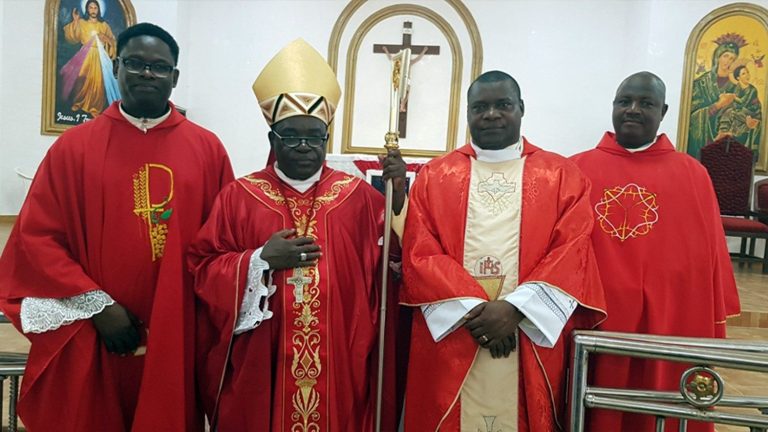YAOUNDÈ, Cameroon – A prominent Nigerian prelate says the very structure of the state in Africa’s most populous country is “dysfunctional” and “doesn’t work”, including the division of the country into 36 states and the role of the army in national affairs. .
Despite fears under President Bola Tinubu and Vice President Kashim Shettima, both Muslims, that Nigeria was heading toward increased Islamization, Bishop Matthew Kukah of Sokoto, in the Muslim-majority north, also declared convinced that the new administration would not “instrumentalize” religion.
“I can be sure that in their hands, being a Christian will not be a handicap for me,” Kukah said.
Kukah made the remarks during a November 28 interview with Channels Television, an independent media outlet.
Although he leads a small diocese, Kukah enjoys an outsized presence in Nigerian public life. Holder of a Ph.D. A graduate of the University of London, he is one of the country’s most trusted and admired religious leaders, having served on a national commission for political reform and leading negotiations to end conflict between society Shell and the Ogoni ethnic group over oil operations. in the Niger Delta.
In his new interview, Kukah suggested that the Nigerian state needed to be dismantled and rebuilt.
“The structure of the Nigerian state is not scientific. It’s dysfunctional. It doesn’t work,” Kukah said. “This is why, despite abundance, we still suffer.”
The first mistake Nigeria made, the cleric said, was the creation of states, which he said was a stop-gap strategy to try to prevent a civil war rather than a carefully considered act of nation-building. nation.
For context, Nigeria gained independence from Britain in 1960 as a federation of three regions, each dominated by a particular ethnic group: the largely Muslim Hausa-Fulani in the north, the Yoruba in the west and the Igbo, mainly Christian, to the north. East. Southern groups felt that the political system was unfairly favorable to the north, leading to a coup and counter-coup in 1966 that paved the way for the 1967 Biafran Civil War to 1970.
Three years ago, General Yakubo Gowon, Nigeria’s leader in the 1960s, acknowledged that the decision to divide the country’s three regions into a series of small states was motivated largely by the hope that it would help to prevent the country from collapsing.
Yet, according to Kukah, the division into states was not well thought out and exacerbated tensions rather than resolving them, comparing it to the Berlin Conference of 1884 in which European colonial powers arbitrarily divided the Africa into nation states.
“We are no different from the Berlin conference,” Kukah said. “The big guys just sat down… these guys just made their village the seat of local government or the state of their village. »
He said the arbitrariness with which states were created stoked ethnic consciousness and people began to think and act in terms of ethnic identities.
“Many governors do not know the ethnic groups that make up the state they govern. Many governors have probably never traveled, even within the state they govern,” Kukah said.
“They may never do it, because apart from the State House, you go to the local government headquarters, it’s a state visit, unless you make a tape somewhere,” he said. he declared.
Kukah said that “power is not just something you hold. Power and office are two different things. The office is different. Power is different. You can have an office and not have the power. You can have power and not hold office.
Furthermore, Kukah said the role of the military in Nigerian life was also problematic, saying “the military has destroyed the foundations of democracy.”
“Forget good soldiers or bad soldiers, because the army had no objective to come to power in Nigeria, other than just anger,” he said.
“What we see now is what the military decided to give us without scientific precision, without paying attention to minorities,” Kukah said. “That is why the minority agitations from the Niger Delta to the middle belt have remained unchecked, so that we are where we are now.”
Known for his harsh criticism of successive regimes in Nigeria, Kukah said Tinubu, for all his shortcomings, is not “ignorant of the political terrain in Nigeria”.
“He is perhaps the first person to come out of what we might call the human struggle, I mean, the civil society struggles of the last 20 years or more. So it is difficult for him to make mistakes if he is serious about what he needs to do, if he already has an idea and if he is clearly passionate about human rights, justice, justice , fairness,” Kukah said.
The cleric dismissed fears that Tinubu, a Muslim-Muslim candidate, could seek to Islamize the country.
“People were wondering why I wasn’t shouting against the Muslim-Muslim ticket,” Kukah said. “I focus on individuals and what I think they can bring to the table. They don’t have to be from my community, they don’t have to be Catholic, they don’t have to be Christian.
Referring to Tinubu and Shettima, Kukah said “my knowledge of them is enough for me to know that they are not people who will instrumentalize religion.”
“They may have other faults, but I can be sure that being a Christian will not be a handicap for me,” Kukah said.
He said for Tinubu to succeed in a “complex country” like Nigeria, he must have “sophisticated listening devices that enable him to hear the voices of the voiceless, wherever they are.”


